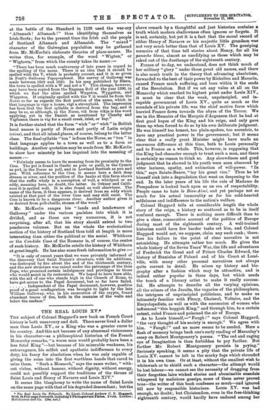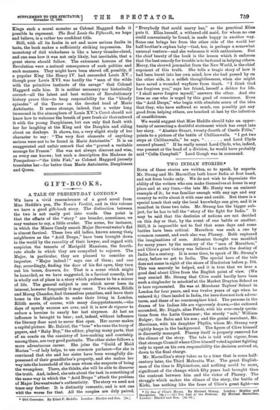THE REAL LOUIS XV.* THE subject of Colonel Haggard's new
book on French Court history is both unsavoury and dull. There never lived a duller man than Louis XV., or a King who was a greater curse to his country. And this not because of any abnormal viciousness in his character—as a philosophical historian of the French Monarchy remarks, "a worse man would probably have been a less fatal King "—but because of his miserable weakness, his extravagance, his selfish and apathetic indifference to every duty, his fancy for absolutism when he was only capable of giving the reins into the first worthless hands that cared to seize them. " Such a Monarch," says the same writer, " with- out virtue, without honour, without dignity, without energy, could not possibly support the traditions of the throne of Saint Louis and Henry of Navarre and Louis XIV."
It seems like blasphemy to write the name of Saint Louis on the same page with that of his degraded descendant ; but the
• The Real Louis the Fifteenth. By Lieut.-Colonel Andrew C. P. Haggard. With 34 Pull.page Portraits, including 2 Photogravure Plates. 2 vols. London : Hutchinson and Co. Ms. net.1
above remark by a thoughtful and just historian contains a truth which modern shallowness often ignores or forgets. It is sad, certainly, but yet it is a fact that the moral record of either Henry of Navarre or his majestic little grandson was not very much better than that of Louis XV. The gossiping memoirs of that time tell stories about Henry, for all his panache blanc, almost as unedifying as those which may be raked out of the dustheaps of the eighteenth century.
France of to-day, we understand, does not think much of her military "glory " under those great old names, and there is also much truth in the theory that advancing absolutism, forwarded to the best of their power by Richelieu and Mazarin, caused France much suffering, and bore within it the seeds of the Revolution. But if we set any value at all on the Monarchy which reached its highest point under Louis XIV., it must be clear that the weak, unprincipled, and in- capable government of Louis XV., quite as much as the scandals of his private life, was the chief motive force which hurried France down towards the abyss of the Terror. We see in the Memoirs of the Marquis d'Argenson that be had at first good hopes of the King and his reign, and only gave them up when forced to do so by his own deliberate judgment. He was himself too honest, too plain-spoken, too eccentric, to have any practical power in the government; but it seems clear that a really great Minister might have made an enormous difference at this time, both to Louis personally and to France as a whole. This, however, is supposing that the King had character enough to trust such a man, and there is certainly no reason to think so. Any shrewdness and good judgment that he showed in his youth were soon obscured by utter laziness, apathy, and extinction of will-power. In this," says Sainte-Beuve, "lay his great vice." Thus be let himself sink into a degradation that went on deepening to the end. In the later years of his life the rule of Madame de Pompadour is looked back upon as an era of respectability. People came to hate le Bien-Aime, and yet perhaps not so much for his actual immorality as for his cold-hearted selfishness and indifference to the nation's welfare.
Colonel Haggard tells at considerable length the whole story of the reign, a history so scattered as to be in itself confused enough. There is nothing more difficult than to give a clear, consecutive account of the politics of Europe during most of the eighteenth century. A well-trained historian could have few harder tasks set him, and Colonel Haggard would not, we suppose, claim any such rank ; there- fore his failure in the point of clear narrative is not astonishing. He attempts rather too much. He gives the whole history of the Seven Years' War, the life and adventures of Frederick the Great and of Prince Charles Edward, the history of Stanislas of Poland and of his Court at Lune- vile, with many other personal narratives not always quite correct in detail. He mixes up history and bio- graphy after a fashion which may be attractive, and is indeed rather popular in these days, but which needs the touch of a literary artist to make it really success- ful. He attempts to describe all the varying opinions, all the crimes of the Jesuits, the vagaries of the philosophers, the intrigues of unprincipled politicians, and to make us intimately familiar with Fleury, Choiseul, Voltaire, and the Encyclopedists, as well as with the succession of women who influenced "this hoggish King," and through him, to a certain extent, ruled France and poisoned the air of Europe.
As to Louis himself,—" Faugh !" says Colonel Haggard, ".the very thought of his society is enough." We agree with him. " Faugh ! " and no more seems to be needed. Here a flash of memory brings back one's early reading of Macaulay's essay on Robert Montgomery's poems. " The red and raging eye of Imagination is then forbidden to pry further. But further Mr. Robert Montgomery persists in prying." Seriously speaking, it seems a pity that the private life of Louis XV. cannot be left in the murky fogs which shrouded it in his own time. Or at least, without the smallest wish to whitewash or to shield such a character—the attempt would be lost labour—we cannot see the necessity of dragging from their forgotten lairs wicked stories and abominable scandals whispered by malicious gossips, some of them never proved true—the writer of this book confesses as much—and ignored till now by responsible historians. Louis XV. was bad enough, no doubt ; but Christendom, even in the free-thinking eighteenth century, would hardly have endured among her Kings such a moral monster as Colonel Haggard finds it possible to represent. The Real Louis the Fifteenth, we hope and believe, is a rather too confident title.
Still, with all its faults in art and more serious faults in taste, the book makes a sufficiently striking impression. Its monotony of dull wickedness is like a heavy thunder-cloud, and one sees how it was not only likely, but inevitable, that a great storm should follow. The extremest horrors of the Revolution were a natural consequence of such politics and such manners. They might have been staved off, possibly, if a popular King like Henry IV. had succeeded Louis XV.; though poor Louis XVI. was hardly the " man of the wilds with the primitive instincts of the savage " that Colonel Haggard calls him. It is neither necessary nor historically correct—all the latest and best writers of Revolutionary history prove this—to heap responsibility for the " bloody episodes " of the Terror on the devoted head of Marie Antoinette. It seems strange, indeed, that a writer long immersed in the atmosphere of Louis XV.'s Court should not know how to welcome the breath of pure fresh air that entered it with the young Dauphiness, but can only find fault with her for laughing at the King and the Dauphin and riding about on donkeys. It shows, too, a very slight study of her character to say : " The very first elements of anything serious were not to be found in Marie Antoinette." It is an exaggerated and unfair remark that she " proved a veritable scourge for France." She was not always discreet and wise, as every one knows; but such a description fits Madame de Pompadour—" the little Fish," as Colonel Haggard jocosely translates her—far better than Marie Antoinette, Dauphiness and Queen.



























































 Previous page
Previous page